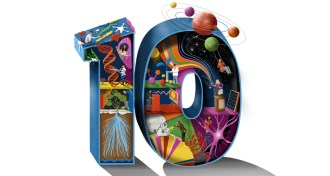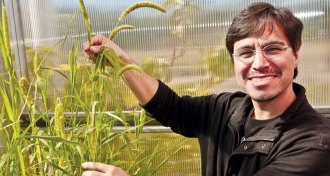Uncategorized
-
 Science & Society
Science & SocietyThe SN 10: Meet the scientists ready to transform their fields
In this year’s SN 10, meet early- and mid-career research stars who are coming up with and testing new ideas in astronomy, archaeology, artificial intelligence and more.
-
 Plants
PlantsJosé Dinneny rethinks how plants hunt for water
Plant biologist José Dinneny probes the very beginnings of root development, which may have important implications for growing food in a changing climate.
By Susan Milius -
 Physics
PhysicsJennifer Dionne harnesses light to illuminate nano landscapes
Nanophotonics research by materials scientist Jennifer Dionne could lead to improved drugs, cancer tests or invisibility cloaks.
-
 Computing
ComputingM. Ehsan Hoque develops digital helpers that teach social skills
Computer scientist M. Ehsan Hoque programs emotionally attuned assistants that bring people together.
By Bruce Bower -
 Life
LifeKC Huang probes basic questions of bacterial life
A physicist by training, Kerwyn Casey Huang tries to understand cell shape, movement and growth.
-
 Astronomy
AstronomyDavid Kipping seeks new and unexpected worlds
Astronomer David Kipping became “the moon guy” by deciding no idea is too crazy.
-
 Chemistry
ChemistryChong Liu one-ups plant photosynthesis
Chong Liu mixes bacteria and inorganics into systems that can generate clean energy better than a leaf.
-
 Life
LifeLena Pernas sees parasitic infection as a kind of Hunger Games
In studies of Toxoplasma, parasitologist Lena Pernas has reframed infection as a battle between invader and a cell’s mitochondria.
-
 Neuroscience
NeuroscienceKay Tye improvises to understand our inner lives
To figure out how rich mental lives are created by the brain, neuroscientist Kay Tye applies “a new level of neurobiological sophistication.”
-
 Anthropology
AnthropologyChristina Warinner uncovers ancient tales in dental plaque
Molecular biologist Christina Warinner studies calculus, or fossilized dental plaque, which contains a trove of genetic clues to past human diet and disease.
-
 Health & Medicine
Health & MedicineLuhan Yang strives to make pig organs safe for human transplants
A bold approach to genome editing by biologist Luhan Yang could alleviate the shortage of organs and ease human suffering.
-
 Science & Society
Science & SocietySuccess in science depends on luck, plus much more
Acting Editor in Chief Elizabeth Quill says luck is only one determinant of an individual's success in science.